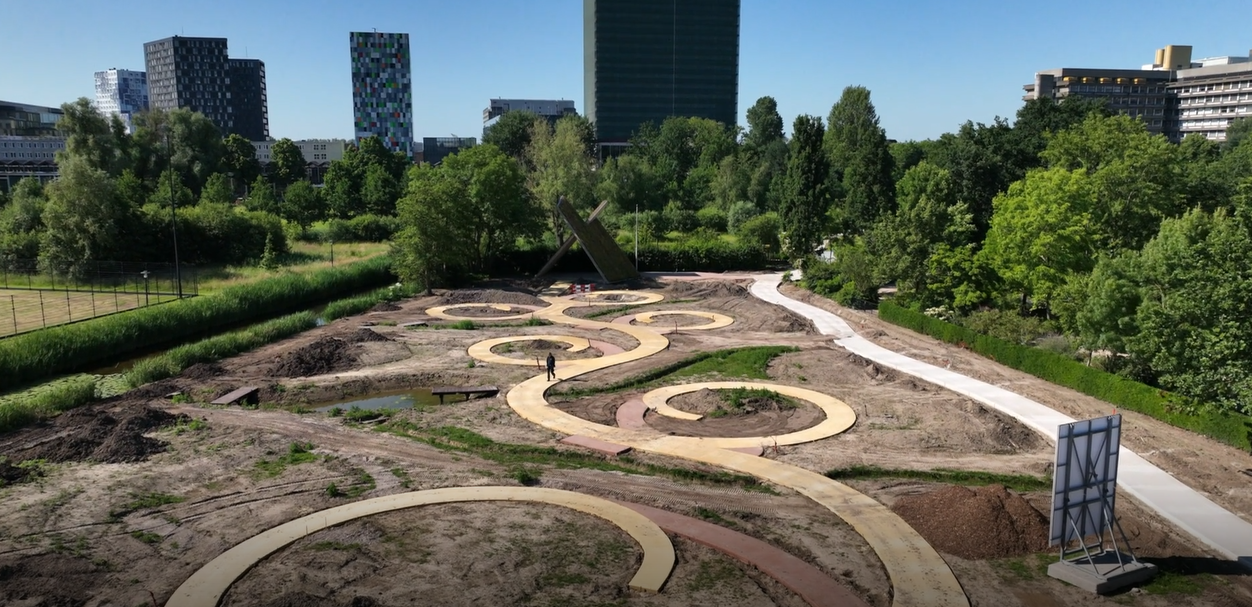The Green time machine, a new Evolution garden
The new Evolution Garden will continue to be constructed in 2024 and will be open to visitors, but occasionally inaccessible during work. The official opening of the evolution garden is scheduled for June 2025.

Since early 2022, we have been working hard to build the Green Time Machine; a new Evolution Garden. This new garden is situated behind the Discovery Garden.
All paths and other infrastructure have now been laid. The entrance to the new garden has been clearly marked with the installation of the artwork Akwaglot, a wooden canopy. In autumn 2022, the first trees were planted and we installed large rock formations on which mosses and ferns will soon be able to grow. In 2023, we will continue planting the garden and the public information will also take shape. The official opening to the general public is planned for 2025.
About the design
The new Evolution garden is based on an innovative design based on fractals: mathematical patterns that can be zoomed into infinitely because the starting pattern repeats itself over and over again. The 'fractals' in the new Evolution garden depict that evolution never stops as long as there is life and that the processes of speciation and extinction continue indefinitely. This unique concept of the Evolution garden was worked out by landscape architects from Hemelse Natuur in collaboration with Utrecht University Botanic Gardens. It all sounds very complicated, but for the public, the Green time machine will be much more accessible than the former Evolution garden. In the Green time machine, you walk from the beginning of plant evolution (single-celled algae) to today's wealth and diversity of flowering plants. During that walk, you span roughly 450 million years of plant evolution!
The Evolution Garden is the scientific heart of Utrecht University Botanic Gardens and tells the story of the evolutionary relationships of the plant kingdom
Why a new Evolution garden?
Our former Evolution garden has always been primarily a teaching garden where students studied and learned about the relationships between plants. This old garden (also called System garden) dates back to 1981 and is based on the views of the American botanist Cronquist. He determined the evolutionary relationships of plants mainly using secondary plant substances. These are substances produced by the plant itself, but which play no role in primary metabolism. But... research into plant development has not stood still in recent decades, of course! For instance, DNA research has revealed that Cronquist's classification is incorrect in many respects. That coupled with the fact that the Botanical Gardens no longer want to tell the story of plant evolution only to students, but also to the general public, made it time for a new Evolution garden.
So we kill two birds with one stone: the Green time machine meets the latest scientific insights on plant evolution and will be more engaging, so that everyone can not only enjoy a beautiful part of the garden but can also discover all about the evolution of the plant kingdom.
What will happen to the old Evolution garden?
The old Evolution Garden will be gradually dismantled. Many plants that are there now will be moved to the Green time machine. The idea is that by the end of 2023, early 2024, we will have moved most of the plants to the new Evolution garden. The trees and shrubs that stay behind will be further supplemented with perennials. The details of this still needs to be worked out. The basic idea is that large lawns alternate with borders here and there. Gradually, the old Evolution garden can then serve as an event space.
Contribute to biodiversity research
Many animal and plant species are losing their natural habitat or disappear altogether due to the effects of climate change. The consequences of this loss of biodiversity are enormous. It is therefore not only important that society knows this, but also that there is a greater appreciation of biodiversity and the process that led to this: evolution. In the new Evolution Garden our scientists will study the development of plants and biodiversity. Your donation will contribute to the coming about of the Evolution Garden.

